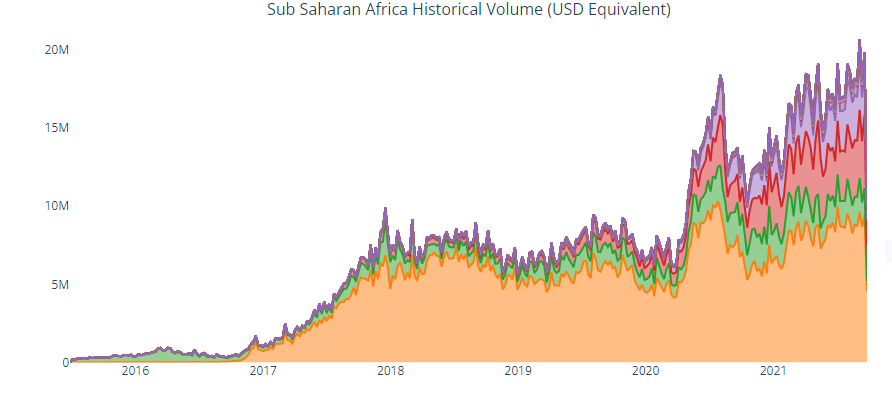The Central Bank of Nigeria (CBN) has reportedly ordered commercial banks to freeze the accounts of individuals engaged in crypto trading. This directive was issued through a post-no-debit circular authorized by the Director of Banking Supervision, J. Y. Mammanand, on the November 3rd 2021.
CBN Closes Accounts Transacting Crypto
The move appears to be part of a broader plan by banking regulators to close the accounts of residents and companies that transact cryptocurrency. The central bank had previously prohibited banks from servicing crypto exchanges earlier in the year in February. It cited issues like volatility, money laundering, and terrorism financing as reasons for the restriction.
Following the closure of bank accounts of two individuals over crypto trading, citizens took to Twitter to express their shock. Incidently Twitter is also banned in Nigeria.
David Heudyen, a well-known journalist in Nigeria and founder of West African weekly, warned peer-to-peer (P2P) users of the CBN’s ban.
I was going to do a story about this, but I think a thread is more immediate.
— David Hundeyin (@DavidHundeyin) November 9, 2021
Emperor Emefiele is on a rampage and he is actively going after Binance P2P users, in conjunction with the banks. FCMB, Kuda and GTB in particular. pic.twitter.com/tyCvGexWKX
Another popular Twitter influencer Danny Walter, also suggested that agents of the CBN were joining P2P platforms and flagging users’ accounts. This is significant news and time will tell how effective a strategy this is for discouraging the use of crypto.
CBN now plant agents on Binance P2P to trade with you and intentionally add crypto keywords to the payment transaction so it can alert your bank to block your account.
— D A N N Y 👑 (@DW3663) November 9, 2021
Nigeria is depressing!
Increasing Crypto Adoption in Nigeria
Nigeria’s history with crypto is fraught with government opposition to the industry. Despite this, the rate of adoption of Bitcoin has not slowed down. A combination of political and economic difficulties, social repression, currency controls, and high inflation has fueled local crypto growth.
The major driver of this growth has been peer-to-peer transactions that have now come under attack from the CBN. According to Useful Tulips, P2P Bitcoin trading denominated in Nigerian naira has also rapidly increased in 2021. Nigeria ranks second only to the US as the largest market for peer-to-peer BTC trading.

Source: Useful Tulip
The P2P transaction volume of crypto has grown steadily over the years. A significant point of note, however, is the sharp increase that occurred since the CBN’s ban. In February, Nigeria’s traded value stood at $7.5 million, this grew by 19.8% to $9.3 million in September. This indicates the ban has forced the country’s burgeoning crypto users underground to escape government scrutiny.
According to a recent report by Chainaylis, Nigeria has the highest rate of cryptocurrency ownership globally, at 24.2 %. It is yet to be seen what effect the current action of the CBN will have on the adoption of cryptocurrency in Nigeria.
Possible Reasons For The Clampdown
Several reasons may be responsible for the sudden and aggressive clampdown of P2P transactions. Recently, Nigeria launched its Central Bank Digital Currency (CBDC), but the preference for crypto assets meant adoption for the e-Naira has been slow. The desire for mainstream adoption of e-Naira instead may be behind the central bank’s latest action.
Another reason may also be the fallout of the “End SARS” protests in October 2020. The role crypto assets played in the protests has not been forgotten. Amidst the protest turmoil, demonstrators increasingly turned to cryptocurrencies to keep their economic activity out of the grasp of the government.
The international community came out in full support of the protesters, with prominent names tweeting their solidarity. Changpen Zhao, Justin Sun, Ray Youssef, and Jack Dorsey all tweeted in support of the End SARS movement.
Do you see the Nigerian government’s actions slowing down crypto adoption in Nigeria? Let us know in the comments below.
 tokenist.com
tokenist.com